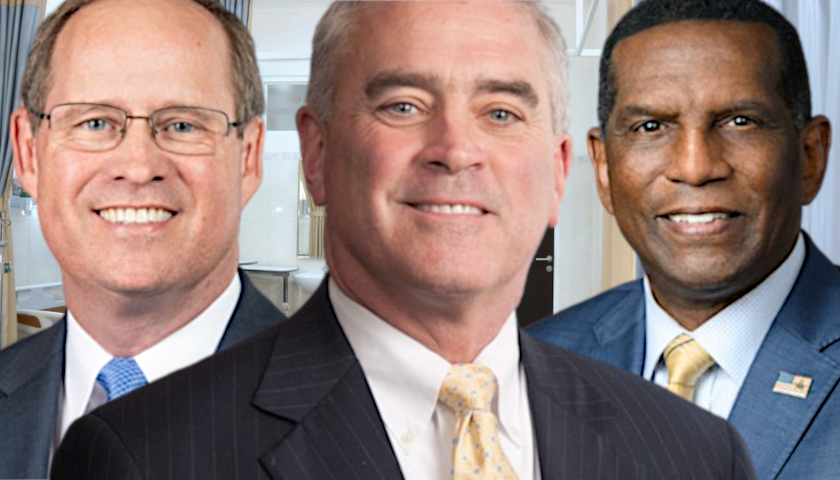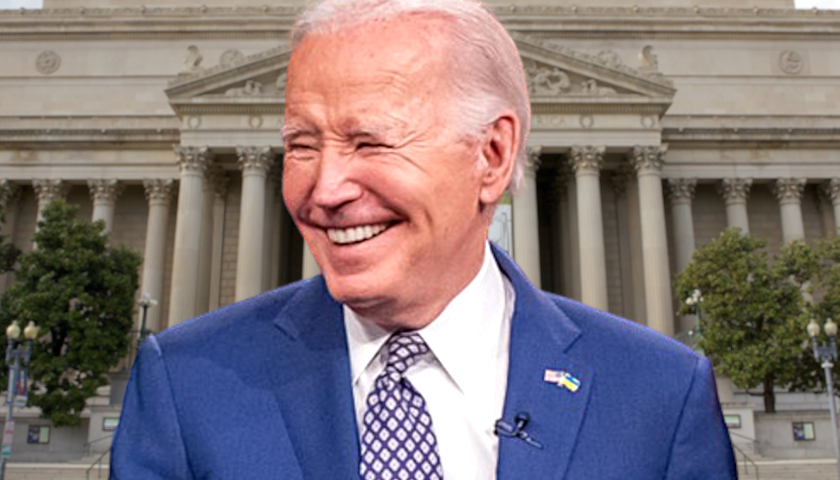by Alan Wooten
Educating from the podium and advocating for the inclusion of all, congressmen led by North Carolina’s Dr. Greg Murphy and Ohio’s Dr. Brad Wenstrup on Tuesday introduced legislation that would halt taxpayer money from going to medical schools promoting racial bias.
Multiple speakers, both Black and white and at least one saying she’s neither Republican nor Democrat, drove home the message directly and indirectly that health care is about the patients and their outcomes. Collectively, they explained how the best care comes from the best in education, that all can access it, and the promotion of “critical race theory-based woke philosophy based on DEI” will put Americans’ lives at risk.
“As physicians and lawmakers,” Wenstrup said at a Tuesday afternoon press conference in Washington, “we have a responsibility to have oversight on the education in the United States of America at all levels. And in this case, when we talk about medicine, that includes medical school and residency training. So much of that is funded by Congress with taxpayer dollars.
“We’re all for a path for opportunity, for people that traditionally – their backgrounds, their family background – may not have an opportunity or think they don’t have an opportunity to achieve a lot, to go into medicine. Talk to Dr. Ben Carson about that sometime.”
He minced no words in saying those promoting diversity, equity and inclusion is a promotion of discrimination.
“I looked up the word equity,” he said. “The quality of being fair or impartial. But the idea of being ruled in, or in some cases, ruled out based on attributes that have nothing to do with trying to create someone who can be a caring, compassionate and competent caregiver is not impartial. It is partial. It is not fair. It is unfair. In fact, it is blatant discrimination.”
The EDUCATE Act, an acronym for Embracing anti-Discrimination, Unbiased Curricula, and Advancing Truth in Education, would ban race-based mandates at medical schools and accrediting institutions.
“The EDUCATE Act,” Murphy said, “will cut off federal funding to medical schools that force students or faculty to adopt certain beliefs, discriminate based on race or ethnicity, or have diversity, equity and inclusion offices or any functional equivalent. The bill will also require accreditation agencies to check that their standards don’t push these practices while still allowing instruction about health issues tied to race, or collecting data for statistics.”
U.S. Rep. Burgess Owens, R-Utah, one of the few non-doctors speaking and member of the 1980 Super Bowl champion Raiders, said his physicians growing up in the 1960s around Tallahassee, Fla., were in position because of their merit. They were Black like him, he said. He also explained the real problem of getting Blacks or other minorities to become physicians begins with the failures to educate, particularly reading, in grades K-12.
Burgess said his son-in-law, who is not Black, worked hard and was at the top of his class. He now owns his business.
“Based on DEI, because Chris doesn’t look like me, he’s a different color, he might not have the opportunity he has today,” Burgess said. “DEI promotes people and policies based on race, gender, religion and sexual orientation rather than merit, talent and hard work. This is not the American dream.”
Dr. Stanley Goldfarb, chairman of Do No Harm, told those assembled, “I’ve had a front-row seat to the corruption of medical education. Precious classroom and clinical time is now devoted to such issues as climate change, homelessness, policing and other social issues that doctors cannot change. The idealogues behind this trend don’t want a doctor, they want lobbyists in white coats. The Association of American Medical Colleges, which effectively controls medical education, now forces medical schools to teach intersectionality, oppression, colonization, and white supremacy, among other core DEI topics.
“One medical student recently told my organization, ‘I’ve learned more about pronouns than I have about kidney disease.’ And patients should be terrified about this kind of education.”
Dr. Tabia Lee, fired from her position as faculty director of Diversity, Equity and Inclusion at De Anza Community College in California, sued the institution on First Amendment rights. She said she’s not affiliated with either major party, but each should have members wanting to pass the legislation.
“I come to you today as a lifelong educator, former DEI faculty director in the California community college system, who has up close and personal experience with toxic critical social justice DEI overtaking institutions of learning.
“It’s important for us to educate, not indoctrinate.”
Kenny Xu, like Murphy an alumnus of Davidson College, was unsuccessful two weeks ago in a North Carolina Republican primary bid in the 13th Congressional District. Fright best describes what he sees and feels.
“DEI is strictly based on the critical race theory ideology, that America is systemically a racist country, that white people are racist, and in order to combat that, we have to be racist against white people, and against Southerners, and against conservatives,” Xu said. “As a member of a southern state, and a conservative state, the fact that medical schools treat people and leverage people’s education to indulge them in critical race theory-based woke philosophy based on DEI really scares me.”
Owens said bigotry is not embraced in any segment of society.
“As Americans, we disdain it,” he said. “There are results that are very predictable when it comes to bigotry called DEI. It is not a matter of if, but when and how many lives will be lost if we do not eradicate this from our medical system.”
– – –
Alan Wooten is Managing Editor at The Center Square.
Photo “Rep. Greg Murphy” by Rep. Greg Murphy
Photo “Rep Brad Wenstrup” by Rep. Brad Wenstrup
Photo “Rep. Burgess Owens” by Rep. Burgess Owens
Photo “Hospital Ward” by gorden murah surabaya





